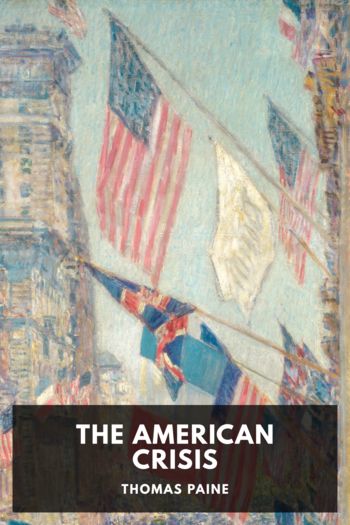Fateful Lightning: A New History of the Civil War & Reconstruction, Allen Guelzo [best thriller novels of all time txt] 📗

- Author: Allen Guelzo
Book online «Fateful Lightning: A New History of the Civil War & Reconstruction, Allen Guelzo [best thriller novels of all time txt] 📗». Author Allen Guelzo
This line of reasoning did nothing to stanch the hemorrhaging of Douglas’s reputation within the Democratic ranks. Southern Democrats, who were overjoyed at the Dred Scott decision, were furious at Douglas’s refusal to submit tamely to the Supreme Court’s dictum. What was more, the new president, James Buchanan, had welcomed the Dred Scott decision as a convenient way of declaring the Kansas problem settled. Buchanan, surrounded by a mostly Southern cabinet, was irritated that Douglas was threatening to spoil that settlement by suggesting that anti-slavery Kansans might yet have the means to obstruct a pro-slavery settlement and prolong the Kansas turmoil. As Douglas approached senatorial reelection in Illinois in 1858, it became a real question as to whether Buchanan’s vengeful willingness to manipulate party patronage against Douglas might not prevent Douglas from returning to the Senate.8
The Republicans had been thrown into similar disarray by the Dred Scott decision. They had assumed that their task was the creation of a congressional coalition large enough to block any attempt to admit Kansas or any other new territory as a slave state, and perhaps even restore the rule of the Missouri Compromise. Now the Court’s decision had pulled the rug out from under them by declaring that neither Congress nor anyone else had the authority to create such an obstacle. For that reason, desperate Republicans—especially in the East—began to hearken to the song of Stephen A. Douglas. Douglas’s argument that popular sovereignty (at least in its passive form) was now the only workable means of keeping slavery from the territories convinced many Illinois Republicans that, especially for the 1858 senatorial race, it was time to stymie Taney and Buchanan and throw their support behind Douglas.
There was, however, one Illinois Republican who dissented from this view of Douglas, and that was Abraham Lincoln. In 1858 Lincoln was forty-nine years old, one of the most outstanding lawyers in Illinois, and equally one of the most prominent state Republicans. Lincoln had come by his successes the hard way. Born in a crude log cabin in 1809 in Kentucky, Lincoln had known little before his twenty-fifth birthday but the poverty and hardships that formed the substance of backcountry life. “There was an unbroken wilderness there then,” he recalled in an autobiographical sketch he wrote in 1859, “and an axe was put in his hand; and with the trees and logs and grubs he fought until he reached his twentieth year.” Lincoln had also imbibed anti-slavery opinions almost with his mother’s milk, since his parents, Thomas and Nancy Lincoln, were both members of an ultra-Calvinistic Baptist sect that banned slaveholding members from their fellowship. In fact, the spread of slavery across Kentucky was one of the motivations for Thomas Lincoln to uproot his family and move first to Indiana and then finally to Illinois.9
Their views on slavery may have been almost the only things Thomas and Abraham Lincoln had in common. Thomas Lincoln was content to be a farmer, only marginally literate—Lincoln recalled that his father “never did more in the way of writing than to bunglingly sign his own name”—but at least moderately successful in his calling. Abraham, however, grew up with a passion for self-education and social betterment. He rejected his father’s raw Calvinistic religion; his reading turned instead to religious skeptics—Thomas Paine, Constantin Volney, Robert Burns—and the Enlightenment’s rule of reason. His stepmother, Sarah Bush Johnston, whom Thomas married after the death of Nancy Lincoln in 1818, recalled in 1865 that “Abe was a good boy,” but he “didn’t like physical labor—was diligent for knowledge.”
He read all the books he could lay his hands on. … Abe read histories, papers & other books. … He had a copy book—a kind of scrap book in which he put down all things and this preserved them. He ciphered on boards when he had no paper or no slate and when the board would get too black he would shave it off with a drawing knife and go on again. … Abe, when old folks were at our house, was a silent & attentive observer—never speaking or asking questions till they were gone and then he must understand Every thing—even to the smallest thing—Minutely & Exactly—he would then repeat it over to himself again & again—sometimes in one form and then in another & when it was fixed in his mind to suit him he became Easy and he never lost that fact or his understanding of it. Sometimes he seemed pestered to give Expression to his ideas and got mad almost at one who couldn’t Explain plainly what he wanted to convey.10
In 1831 Abraham Lincoln struck out on his own, trying his hand at anything that offered him a way up the ladder. He tried clerking and postmastering in a store in the village of New Salem, Illinois, but succeeded at neither, and in 1832 he took his first turn at politics.
Politically, Lincoln found himself almost instinctively drawn to the Whigs rather than the Democrats. The Whigs celebrated the Union, deplored the loud demands of the states for first loyalties, and called for an enabling role for government in the economy, railroads, and internal improvements, with protective tariffs





Comments (0)